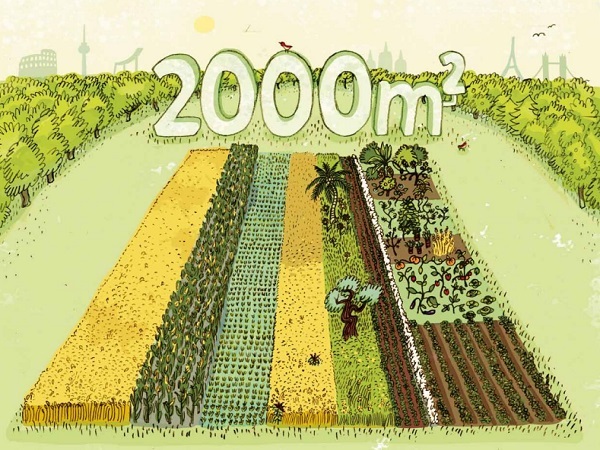 Credit: © Zukunftsstiftung Landwirtschaft
Credit: © Zukunftsstiftung Landwirtschaft
In the latest in a series of articles about current conservation issues, experts at natur&ëmwelt, a leading nature conservation NGO in Luxembourg, spoke to Chronicle.lu about an educational initiative called "2000m² for our food".
This initiative was established in collaboration with the Institut fir Biologësch Landwirtschaft an Agrarkultur (IBLA asbl), natur&ëmwelt asbl and co-labor s.c., and is funded by Luxembourg’s Ministry of the Environment, Climate and Sustainable Development.
Natur&ëmwelt volunteer Mithila Unkule helped collect relevant information from the NGO for this article.
Chronicle.lu: "2000m² for our food" is an intriguing title. What is this project about?
Natur&ëmwelt: In this project, we grow local varieties of crops that can comprise a balanced diet for one human, completely organically, on a 2000m² piece of land. It was started to create awareness about available farmland and the amount of energy and resources needed to produce food. It also encourages people to think about their eating and consumption habits, and to consider regional, sustainable agriculture.
Chronicle.lu: Why 2000m²?
Natur&ëmwelt: If we divide the amount of agricultural land in the world by the number of humans, every person would receive a share of 2000m², and hence this choice of area. Currently, every resident of Luxembourg is using roughly 8000m² of land for their food requirements and it is high time we consciously change this.
Chronicle.lu: Please tell us more about the workings of the land. What do you grow there?
Natur&ëmwelt: Luxembourg traditionally has climate and soil suitable for pastures (grazing land) and almost 90% of farmland is currently used to raise (mostly) cows. We respect existing farming practices, and so keep half of the land (1000m²) aside for pastures. However, we also hope to raise awareness that the other half (1000m²) is enough to grow necessary food for one person for a year. The rest of the plot grows a variety of fruits, vegetables and legumes that suit the environmental conditions of Luxembourg. The aim is to try and incorporate conscious changes in food production and consumption, without drastically changing farming patterns.
Chronicle.lu: What is conscious food consumption and why is it important? If the soil here is suitable for livestock farming, why not continue with that?
Natur&ëmwelt: Livestock farming needs vast resources and space compared to its vegetarian counterparts, in addition to animals' suffering in intensive farming. We also eat much more meat than required for a balanced, healthy diet. In order to reduce our carbon footprint, we need to be mindful about the amount of meat that we eat and try to increase the proportion of vegetarian proteins to our diet, which require less space and resources to grow. However, it does not give us a free pass to eat exotic vegetarian foods that arrive from across the world, with enormous carbon emissions from transport and storage. Local food is more adapted to the land we live in, needs fewer resources and is sufficient to meet our nutrient requirements.
Chronicle.lu: This is important, but is it practical? Do we have enough space to feed the entire population?
Natur&ëmwelt: Yes, we do! Sadly, there are multiple reasons that stop the country from meeting its requirements, such as food waste, lack of knowledge, outdated practices or simply lobbying. 2000m² is a significant amount of land and we demonstrate its capacity through this project.
The "2000m² for our food" project is located in Kockelscheuer, not far from Luxembourg City. Natur&ëmwelt can also organise visits for groups who would like to see the project for themselves. Further information is available on the website https://www.2000m2.lu/.








